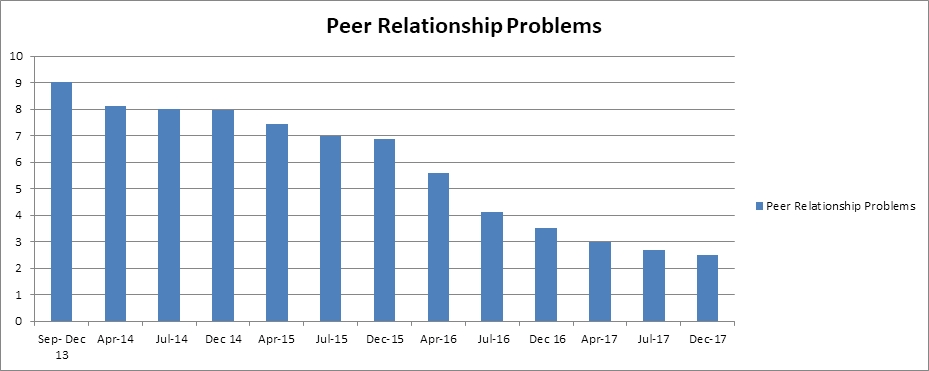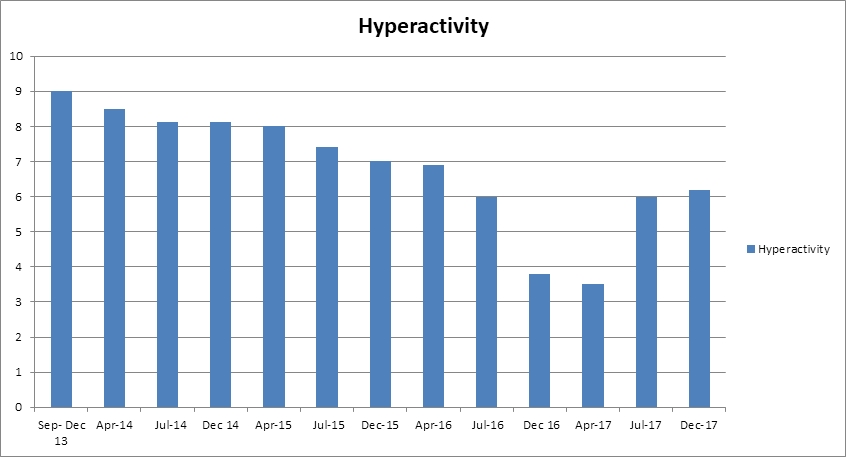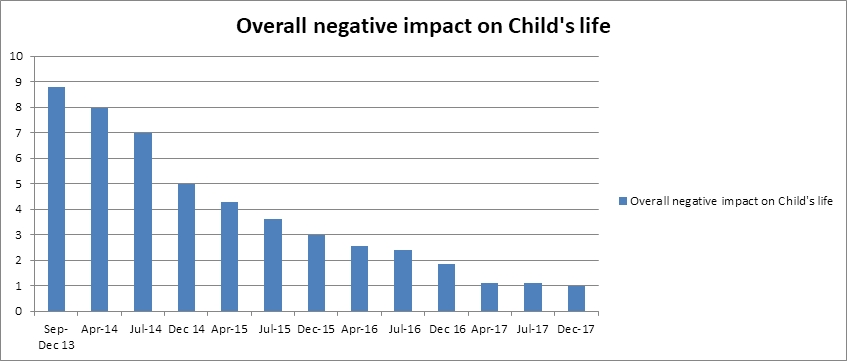The Strengths and Difficulties Questionnaire (SDQ) is a brief behavioural screening questionnaire about 3-16 year olds. It existing in several versions to meet the needs of researchers, clinicians and educationalists. The following components are measured: emotional symptoms, conduct problems, hyperactivity, peer relation problems and pro social behaviour.
| Sep- Dec 13 | Jan- April 14 | May- Jul-14 | Sep- Dec 14 | Jan- April 15 | May- Jul-15 | Sep- Dec 15 | Jan- April 16 | May- Jul-16 | Sep- Dec 16 | Jan- April 17 | May- Jul-17 | Sep- Dec 17 | Jan- April 18 | |
| Overall Stress | 34.8 | 29.25 | 28.12 | 27.3 | 25.64 | 24.92 | 23.34 | 22.85 | 21.64 | 19.3 | 12.26 | 11.1 | 14.6 | 14.8 |
| Emotional Distress | 5.9 | 3.9 | 4 | 3.4 | 2.6 | 3.6 | 3.2 | 2.7 | 3.1 | 3.9 | 3.8 | 3.2 | 3 | 2.7 |
| Behaviour Problems | 9.54 | 8.22 | 7.78 | 7.12 | 6.9 | 6.21 | 5.998 | 3.455 | 2.9 | 3.4 | 2.8 | 2.9 | 3.6 | 3.3 |
| Hyperactivity | 9 | 8.5 | 8.12 | 8.12 | 8 | 7.4 | 7 | 6.9 | 6 | 3.8 | 3.5 | 4 | 6 | 6.2 |
| Peer Relationship Problems | 9.01 | 8.12 | 8 | 7.98 | 7.45 | 7 | 6.87 | 5.6 | 4.12 | 3.5 | 2.98 | 2.4 | 2.7 | 2.5 |
| Kind and Helpful Behaviour | 0.788 | 1.12 | 2.12 | 2.78 | 3.22 | 3.988 | 4.44 | 4.44 | 6.1 | 7.82 | 8.75 | 7.9 | 5.7 | 5.6 |
| Overall negative impact on Childs life | 8.78 | 7.97 | 6.988 | 5 | 4.3 | 3.6 | 2.99 | 2.544 | 2.4 | 1.85 | 1.1 | 0.8 | 1.1 | 1 |
These results are from pupil SDQ scores which are gathered termly. Overall Stress is measured in some mainstream schools and a score of 10 is regarded as the norm. Our pupils’ scores for overall stress is significantly higher than an average mainstream score and results show that we work with pupils to reduce this score over time.
| Average | Slightly Raised | High | |
| Overall Stress (40) | 0-15 | 16 to 18 | 19 to 40 |
| Emotional Distress (10) | 0-5 | 6 | 7 to 10 |
| Behavioural Problems (10) | 0-3 | 4 | 5 to 10 |
| Hyperactivity (10) | 0-5 | 6 | 7 to10 |
| Peer Relationship Problems (10) | 0-3 | 4 to 5 | 6to 10 |
| Kind and Helpful Behaviour (10) | 6 to 10 | 5 | 0 to 4 |
| Impact on Childs Life (10) | 0 | 1 | 2 to 10 |
The CPA Effect
Our pupils come to the CPA with a varying number of ACES (Adverse Childhood Experiences)
By looking at the overall impact that a pupils difficulties has on their life, results show that the CPA is a protective factor in pupils’ lives. The ethos of the school and the impact that it has on helping them feel that they can manage and cope with life’s challenges has gathered momentum since we have been opened.
Our school can help to reduce the impact that these difficulties have on children’s lives and support pupils in developing strategies to help them make better choices and become happier young people.

The CPA is getting better and better at supporting pupils in their friendships with others. Often pupils arrive at our school feeling rejected and very unhappy. They find making friends is often fraught with difficulties and conflict is a typical outcome. By reducing pupils overall stress levels we support them in communicating socially and sharing social spaces and time together. Our vertical tutor group system also leads to peer mentoring, particularly with our older pupils supporting the younger years.


At the CPA a pupil’s levels of overall stress decrease and as a school we are able to help pupils feel less anxious as well as help reduce hyperactivity. In July and September 2017 we had 10, a significant number, of new pupils join our KS3. These younger pupils experience greater levels of hyperactivity than KS4 pupils and this has led to an increased score for the whole school including that of overall stress. We have managed this by introducing another KS3 class and establishing an Autism Aware group of staff, who are working to support theses pupils.

